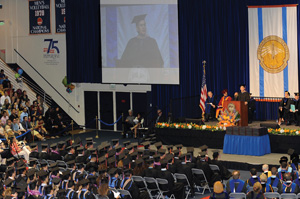The Doing the Being
Graziadio School alumnus Jack Schlafer applies his global business background to developing culturally intelligent business practices.
To Jack Schlafer (MS '12), leadership comprises two factors: the doing and the being. The former refers to the things all great leaders execute well: a compelling vision, putting together the right team to implement that vision, and bringing the entire organization along for the journey. The latter is a complex blend of attributes that is less clearly defined.
“Real leaders have a connection—the X Factor—that is always an important element of leadership,” explains Schlafer, principal program and change manager for the Quality Assurance Division of Microsoft Corporation.
As a student at the Graziadio School of Business and Management, Schlafer first became aware of an emerging organizational concept essential to “being” a successful leader: cultural intelligence (CQ). He describes it as the “adaptability capability”: the capability to be adaptive across multiple cultures. “Cultural intelligence is a repertoire of skills that allows you to be effective regardless of the culture—be it domestic or international—but it also may apply to organization or team cultures. CQ makes you evaluate those and be much more effective.”
Schlafer began his career as an IT professional serving industries ranging from aerospace (Boeing) to consulting and petrochemicals, where he spent five years in Texaco’s west coast IT department. Shortly after joining Microsoft in 1996, Schlafer was called on to lead their U.K.-based program to rationalize IT infrastructure and processes worldwide. “Then I sort of bumped up to another level completely," he says. “I was playing at a global level.” He began stumbling through cross-cultural challenges and needed to adapt in order to resolve them.
“I was woefully unprepared for the cultural challenges. I just didn’t understand the tensions between certain countries and the nuances you have to have to negotiate the change from a Scandinavian country to a European one. Those are widely different cultural experiences.”
In Japan, for example, he learned business card etiquette the hard way. “What you’re
not supposed to do is take the card with one hand, look at it halfway, and put it
in your back pocket,” he advises, recalling a particularly awkward exchange with Japanese
senior businessmen, who were left wondering about Schlafer’s professionalism. “I’ve
just made enough international faux pas to appreciate the sensitivities of cultures,” he admits. It was these cross-cultural
encounters that recently led Schlafer to begin thinking about the culture-specific
attributes that teams can use to become more successful. They also inspired him to
reevaluate his career and examine his contributions to the global business environment—so
much so, that when he decided to return to school in 2010, this time for his second
master’s degree, he sought the perfect fit in the Graziadio School of Business and
Management’s organizational development program (MSOD). He particularly valued the
international component and ability to conduct client intervention work in foreign
countries as part of the curriculum. Jack Schlafer delivers the student speech at the Graziadio School's August commencement
ceremony.
Jack Schlafer delivers the student speech at the Graziadio School's August commencement
ceremony.
Schlafer’s interest and MSOD thesis concentration in CQ have led him to think about globalization and the way leaders who have the “adaptability capability” can set up teams to capitalize on the attributes of cultural intelligence—made up of one’s motivation, their actions, strategy, and cognitive preparation—to become more successful at cross-cultural engagements. “The reason why that’s interesting is because it allows me to have a lens from which to engage more effectively in cross-cultural situations,” says Schlafer, who delivered the student speech at the Graziadio School’s August 2012 commencement ceremony. “Now I’m thinking about what opportunities allow me to fully apply it.”
Currently Schlafer is driving change management for Microsoft while applying CQ to land an important global program. He also leads CQ workshops at the Graziadio School’s MSOD program and the Hudson Institute for Coaching, which provides training in personal and executive coaching.
“Moving forward, I am evaluating all the possibilities of leveraging my background and education to positively impact a cause in some part of the world. My view is that cultural intelligence is not well-known today, but in 15 to 20 years it will be a ubiquitous leadership development offering. In essence it will become a required skill for leaders to be effective in a global marketplace.”
